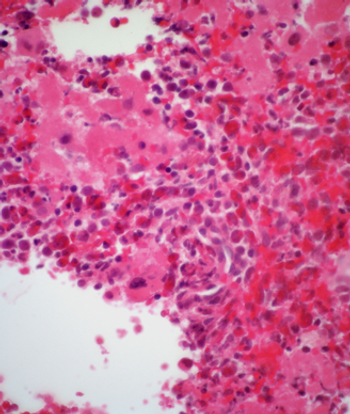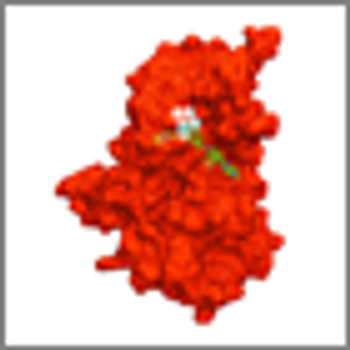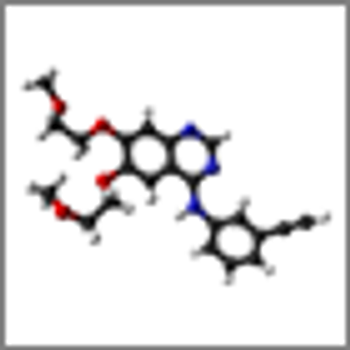
The presence of a TP53 mutation was associated with improved survival in patients with advanced soft-tissue sarcoma who were treated with VEGFR inhibition.

Your AI-Trained Oncology Knowledge Connection!


The presence of a TP53 mutation was associated with improved survival in patients with advanced soft-tissue sarcoma who were treated with VEGFR inhibition.

The use of low molecular-weight heparin failed to improve either metastasis-free or overall survival in newly diagnosed lung cancer patients.

Comprehensive genomic profiling of patients with advanced urothelial carcinoma has revealed a very high frequency of clinically relevant genomic alterations.

Patients diagnosed with non-small-cell lung cancer (NSCLC) at a younger age are far more likely to harbor a targetable genomic alteration than older patients.

The developer of evofosfamide announced that two phase III trials of the agent in advanced soft-tissue sarcoma and in advanced pancreatic cancer did not meet their primary endpoints.

Two studies of the new HER2 selective tyrosine kinase inhibitor ONT-380 showed the drug has promising activity in HER2-positive breast cancer and especially in patients with central nervous system metastases.

Ponatinib offered a better overall survival for chronic myeloid leukemia patients in chronic phase compared with allogeneic stem cell transplantation.

The US Food and Drug Administration granted approval to uridine triacetate (Vistogard) as a treatment for overdose of fluorouracil or capecitabine, which are administered for a number of malignancies.

A mouse study found that resveratrol has a significant antitumor effect in an ovarian cancer model, and also suppressed tumor regrowth following cisplatin.

A case series of three individuals suggests that there may be a causal relationship between chemotherapeutic treatments for germ cell tumors and the subsequent development of chronic myeloid leukemia.

Patients with metastatic or unresectable urothelial carcinoma who are treated with either carboplatin or cisplatin have high rates of vascular thromboembolic events.

A study showed that the use of intraoperative frozen section diagnosis correlated strongly with final pathology for peripheral small-sized lung adenocarcinoma.

The addition of lapatinib to capecitabine/oxaliplatin did not prolong overall survival among patients with previously untreated HER2-amplified gastroesophageal adenocarcinoma.

A phase II trial found that use of a personalized peptide vaccination improved overall survival in patients with chemotherapy-resistant advanced urothelial bladder cancer.

Both radiofrequency ablation and stereotactic body radiotherapy are effective in the treatment of inoperable, non-metastatic hepatocellular carcinoma.

The ALK inhibitor alectinib was highly active and well-tolerated in patients with ALK-rearranged, crizotinib-refractory, advanced non–small-cell lung cancer.

The FDA has approved necitumumab (Portrazza) in combination with chemotherapy for the treatment of patients with metastatic squamous non-small-cell lung cancer.

A retrospective cohort study showed that socioeconomic variables including race, marital status, insurance status, and geography are associated with rates of resection for early-stage pancreatic cancer. Most of these factors, however, were not associated with survival following resection.

A case study of a 15-year-old CML patient suggests that a reduced intensity conditioning regimen following hematopoietic stem cell transplantation could be a good treatment option for young CML patients. The patient went on to have two pregnancies with no neonatal complications.

A meta-analysis found that a number of dietary factors play a role in the risk of developing gastric cancer, with protective effects seen with fruit and certain vegetables and increased risk seen with high-salt foods and certain forms of alcohol.

Imatinib had no impact on failure-free or overall survival in patients with gastrointestinal stromal tumor, but it did have an effect on relapse-free survival.

Dual HER2 blockade with trastuzumab and lapatinib was no better than trastuzumab alone in producing pathologic complete responses in metastatic HER2-positive breast cancer patients in the neoadjuvant setting, according to a new study.

The FDA granted accelerated approval to osimertinib (Tagrisso), previously known as AZD9291, for treatment of advanced non-small-cell lung cancer (NSCLC) with the EGFR mutation T790M.

Many chronic myeloid leukemia patients who discontinue second-line dasatinib maintain a deep molecular response, according to a new study.

Early-stage lung cancer patients considered to be high risk for surgery can achieve good clinical outcomes with surgical resection, according to a new study.

The presence of the gene KIR2DL5B was found to be associated with outcomes in patients with chronic phase chronic myeloid leukemia, according to a new study.

Multiple lesion-directed biopsies can drastically improve the sensitivity of colposcopy in women referred for abnormal cervical cancer screening.

Long-term follow-up confirmed the previously reported result that intermittent administration of imatinib is safe and effective in CML patients.

Despite the early trial termination due to safety concerns, an analysis suggests that ponatinib offers improved efficacy over imatinib in newly diagnosed CML.

In a phase III trial, erlotinib performed no better than placebo when added to sorafenib in treatment-naive patients with advanced hepatocellular carcinoma.